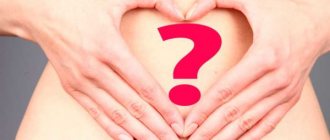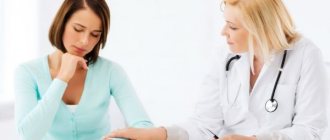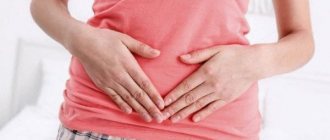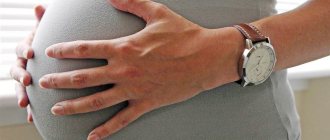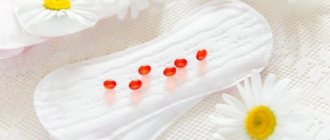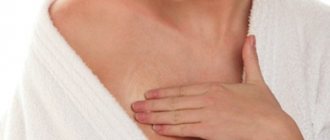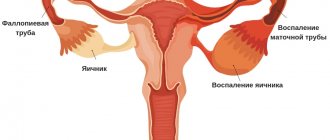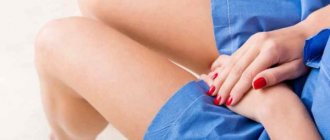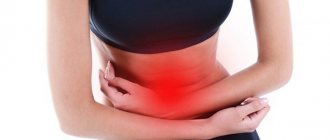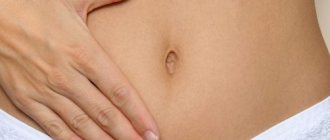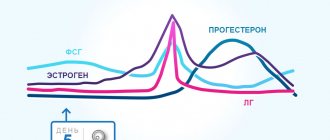- Classification and reasons Cyclic
- Acyclic
- Extramammary
Chest pain, or mastalgia, is a condition that 70% of women have experienced in one way or another. For half of them, discomfort forces them to reduce sexual activity, and for about 12% it prevents them from doing everyday activities. In every tenth (of the total) the painful condition can last more than 5 days a month. Why does this problem arise, and how can we learn to coexist with it? Let's figure it out.
Symptoms
For many representatives of the fair sex, breasts begin to hurt after ovulation and before the onset of menstruation. Unpleasant sensations haunt them from the first menstruation, which began at a young age. Therefore, women do not notice anything unusual or new in their well-being. The condition when the chest hurts in the 2nd phase of the cycle is called mastodynia by doctors.
Important! Each woman experiences this process differently. In one, the symptoms are pronounced. It is impossible to tolerate them and still lead a normal lifestyle. The other has slightly swollen breasts, only mild pain is felt.
Severe chest pain brings, first of all, physical and psychological discomfort. A woman cannot sleep on her stomach and chest, move actively, play sports, or do housework. In this state, not just one week passes, but the entire period before the onset of menstruation.
The reasons for this process lie in hormonal changes before ovulation. The body is preparing for the upcoming conception. If it does not occur, then all symptoms (chest pain, nipple sensitivity) disappear on their own on the day of the start of menstruation.
If you have chest pain that cannot be tolerated, as well as severe swelling, it is better to take a blood test for hormones. Since, most likely, a malfunction occurred in the female body.
What pains are not normal?
It is not difficult to distinguish the normal state after ovulation from deviations in the functioning of internal systems. If a woman has formed a cycle , and the symptoms do not change from month to month, then the signs of the release of an egg from the ovary are well known to her. The exception is girls at a young age, whose menstruation occurs with disruptions in the cycle. The younger the body, the more painful the symptoms of the ovulatory period will be.
The following types of pain cannot be normal:
- spasms that restrict movement;
- attacks accompanied by loss of consciousness or vomiting;
- painful spasms that do not stop for a long time;
- the presence of severe bleeding (not to be confused with the characteristic brown discharge).
Causes of pain
After ovulation, almost every woman experiences breast pain. First of all, this is due to the hormonal imbalance that accompanies the release of an unfertilized egg. This period usually lasts until the onset of menstruation.
Women who feel their body and feel all the changes in it can determine by chest pain at what exact moment ovulation occurred and when to expect the start of menstruation. This will happen on the day when the pain subsides.
Soreness in the breasts after ovulation occurs due to the specific functioning of the reproductive system. In addition, during this period the following features can be observed:
- swelling of the mammary glands;
- vaginal discharge that does not have a specific odor;
- strong sex drive.
All these signs are associated with the onset of ovulation. The main driver of change is the hormone progesterone. After the release of the egg, its level increases noticeably, and it begins to control the 2nd phase of the menstrual cycle. Because of this, the cells of the mammary glands increase in size. As a result, the woman feels pain.
Important! The natural changes that occur in the breasts after ovulation are normal and safe. But if the pain becomes unbearable and appears during any phase of the cycle, then the woman definitely needs to be examined by a mammologist.
In addition, in some cases, the breasts begin to hurt if pregnancy occurs. This usually happens 3–5 days after ovulation. A woman’s body is rebuilt and begins to prepare for bearing a fetus. The same painful sensations can occur without menstruation when breastfeeding.
If pregnancy does occur
Changes in the breasts are one of the first signs of conception. However, if your nipples hurt after ovulation, you should not immediately go to the pharmacy for a test. Even if pregnancy has occurred, it can be confirmed only from the first days of missed menstruation. It is during this period that the fertilized egg implants into the endometrium of the uterus.
If after ovulation your nipples hurt more than usual, you should start taking folic acid. If pregnancy does occur, B vitamins will only benefit the expectant mother and child. Additionally, you should give up bad habits and start eating right.
In addition to discomfort in the chest, you should pay attention to other possible signs of pregnancy. Against the background of hormonal changes occurring in the body, a woman becomes drowsy and cannot fully cope with everyday responsibilities. Already in the early stages of pregnancy, taste preferences may change. The expectant mother consumes foods that were previously absent from her diet.
Already in the first days of pregnancy, weight gain may be observed due to fluid retention in the body. It is worth paying attention to body temperature. In the early stages of pregnancy, this figure can reach 37 degrees Celsius.
Do your nipples hurt after ovulation? In most cases, mild discomfort is normal. If the discomfort intensifies, you should see a doctor as soon as possible. Chest pain may indicate serious problems.
How to reduce discomfort
If a woman is absolutely healthy, her cycle is regular, there are no disruptions in the hormonal system, she may still experience discomfort in the breast area immediately after ovulation. This is a completely normal process. There are a few simple recommendations that will help alleviate the condition on days of maximum discomfort. These include:
- In order for your breasts to stop hurting, you need to choose the right underwear, in particular a bra. It should be made of soft fabric and not cause additional friction to the skin, especially on the sides. This can cause tissue compression and additional discomfort while the mammary gland has enlarged. Just in case, you can buy a sports top and wear it during breast swelling.
- Stop being nervous. This may seem like an impossible task, especially in modern living conditions. But due to constant stress, the female body begins to actively produce prolactin. Its high level causes the breasts to become engorged and painful. To reduce stress, you should use various calming techniques. Each woman has her own ways to quickly calm down - a hot bath, listening to her favorite audio recordings, chocolate or a mug of green tea.
- Eat right, avoiding fatty, salty and smoked foods. This will also reduce the swelling of the glands, the breasts will not be so sensitive. The diet should consist of healthy foods.
- Lose weight. This primarily applies to those women who are overweight. Obesity leads to hormonal imbalance and problems with the menstrual cycle. Doctors advise against sudden weight gain.
- Play sports or perform a minimum set of physical exercises at home. This will help reduce the level of estrogen in a woman’s body, thereby reducing the signs of mastalgia. At the same time, be sure to wear supportive underwear during training so as not to cause even more pain.
- Get enough sleep. During healthy and full sleep, natural metabolic processes occur that help it recover.
In phase 2 of the menstrual cycle, chest pain is a normal condition. If you follow these recommendations, you can easily cope with many unpleasant sensations.
If your breasts begin to hurt too much or tingle, you should not delay your visit to a specialist. The mammologist will conduct a thorough examination to determine the presence of pathology. He carefully examines the mammary glands, skin, nipples, assesses the condition of the lymph nodes and checks whether the breasts hurt on palpation.
Important! Every woman over 35 years old should undergo an examination by a mammologist every six months. This will help diagnose breast cancer at an early stage.
To eliminate the risk of developing serious diseases and confirm mastodynia, the doctor prescribes:
- blood analysis;
- hormone analysis;
- Ultrasound of the breast.
- mammography for women over 35 years of age.
With mastodynia associated with the second phase of the cycle, all indicators in the blood test are within normal limits. During inflammatory processes, the level of leukocytes and lymphocytes will increase, and the ESR will begin to increase. If a woman develops a malignant tumor in her body, then the level of red blood cells and hemoglobin in the blood decreases, and the ESR, on the contrary, increases sharply.
A study of sex hormones will reveal disturbances in the production of estrogen and progesterone. This will help to establish pathological processes in the body that are the main cause of diseases - infertility, polycystic ovary syndrome, fibrocystic mastopathy. Ultrasound examination will detect neoplasms and cystic changes in the mammary gland at an early stage. Mammography diagnoses breast cancer.
After these studies, the doctor decides on further actions. If no pathologies are identified, we can conclude that the feeling of pain in the chest after ovulation is a normal process in a woman’s body. It can only alleviate the discomfort before menstruation, but it is unlikely to be able to completely get rid of it.
Self-examination
Before contacting a mammologist, you should perform a breast examination at home. This is done by palpation. The test should begin 7–10 days after the end of menstruation. To prevent the development of breast diseases, women are advised to palpate themselves monthly. If during the examination any lumps are felt, you should immediately consult a doctor for further diagnosis.
Breast pain after ovulation can bother every woman. It is very important to understand whether this process is natural or becomes a harbinger of a dangerous disease. Modern diagnostic methods and independent monitoring of your health will come to the rescue.
To understand the causes of chest pain during ovulation or at any other period, you need to have a good understanding of the processes that occur in the female body. The inability to determine the causes of pain and ways to eliminate them is associated with a lack of knowledge about your body. Therefore, the site will consider the phenomenon of chest pain during ovulation.
Ovulation is a specific date during which the follicular sac ruptures, from which the egg is released. It travels through the fallopian tubes, where it can meet sperm. After fertilization, the egg will attach to the walls of the fallopian tubes to continue its development. However, if this does not happen, then the layer of the uterine pharynx is rejected, which is why menstrual bleeding occurs.
During the release of the egg from the follicle sac, estrogen in the body decreases. The hormonal background begins to change and prepare for either fertilization or menstruation.
Since from the moment of ovulation until the period itself, the body begins to release certain hormones, a woman may feel pain in the lower abdomen, in the breasts and even in the lower back. Since the body needs to remove the rejected part of the flesh, it requires certain processes. They are what cause pain in some women.
Signs for which you need to see a doctor
If, in addition to discomfort in the area of the SAH, you:
- feel increased fatigue;
- acute pain appears or SAH hurts on the second day of menstruation and beyond;
- you palpate (feel) a lump in the mammary gland;
- the skin of the breast has changed color, becoming red or bluish;
- one of the glands changed size, deformation appeared;
- the skin began to peel off and ulcers appeared.
You cannot put off a visit to the doctor for a minute. But even if you just notice increased sensitivity in your nipples. And the discomfort bothers you for a long time, go to the doctor. Especially if you are over 40 years old. At this age, involutive changes in the breast and the growth of various neoplasms begin.
This concludes our review of this topic. We hope that your main questions have been answered in detail. Visit our page again and invite friends through social networks.
How to calculate the day of ovulation?
Every woman, for her own reasons, wants to know when her ovulation day will come. This is calculated not only to determine from what day it is possible to conceive a child, but also to explain the causes of chest pain, swelling of the mammary glands, and sore nipples. You will have to study the topic of how the day of ovulation is calculated in order to be able to monitor your health:
- The day before menstruation, which you should know for sure, it is necessary to measure the basal body temperature - this is the temperature that is observed in the vagina, anus or mouth when the woman has just woken up, but has not yet gotten out of bed, has not started to move, etc.
- Measure your normal body temperature every day to understand what it is in your normal state. All people have different normal temperatures, and not 36.6 ° C, as is commonly believed.
- Undergo an ultrasound scan that will show which ovary the egg will be released from.
- So, conduct research over at least three menstrual cycles in order to understand trends in changes, normal conditions, etc.
Preovulation syndrome should also be noted, when a woman experiences nausea, dizziness and rapid mood swings. This period begins at the end of menstruation and after the release of a dead egg from the body for 2-3 days.
If breast pain occurs during the period of ovulation, then experts advise not to worry. This is usually a normal process that is a consequence of the effects of hormones on the mammary gland.
Why do my breasts hurt during ovulation? This is due to the fact that on the day the egg is released, the body begins to produce large quantities of progesterone, a hormone that prepares the body for motherhood, regardless of whether the egg is fertilized or not. Hormonal levels change due to a decrease in estrogen and an increase in progesterone. The breasts cannot react normally to this, which also begin to hurt in the first trimester of pregnancy, clearly indicating the emergence of new life inside the woman.
A woman experiences breast pain after ovulation as hormones tell the body to prepare for possible fertilization. Participates in this process, which begins to increase in size. Thanks to this, it begins to put pressure on the connective tissue that surrounds it, which affects the nerve endings located in it. It is not the mammary gland itself that hurts, but its surrounding tissue, which is penetrated by nerve endings.
After menstruation begins, progesterone will no longer be produced in large quantities, causing the swollen tissues to atrophy and the pain will subside on its own. She will no longer bother the woman until the next ovulation and menstruation. However, if the egg is fertilized, the mammary gland will continue to grow and cause pain in the breast. You can check if you are pregnant using a pregnancy test.
Does this phenomenon require treatment?
Whether pain needs treatment directly depends on the cause that triggered its occurrence.
If your chest begins to hurt due to mastopathy, then this disease needs immediate treatment. The development of this disease can be determined by performing a breast self-examination.
If lumps are felt in the tissues of the mammary gland and nearby areas, this indicates the development of the disease. If this happens, you need to visit a doctor. To establish an accurate diagnosis, the specialist will prescribe a number of additional tests, including mammography.
With the natural reaction of the mammary glands to changes occurring during the monthly cycle, no special measures need to be taken.
Most often, when the body reacts to changes in hormone levels, doctors prescribe:
- Taking vitamins.
- Proper nutrition.
- Wearing a special bra.
To summarize, most experts consider chest pain associated with the monthly cycle to be quite normal. However, if the pain is too severe or if it reduces the overall quality of life, it is worth undergoing additional examination to rule out the development of serious diseases. Throughout your life, you need to pay close attention to your breasts; this will help you notice the disease in time and maintain health.
Many processes related to procreation functions occur in the female body. After the process of maturation of the egg is completed and, depending on the circumstances, fertilization occurs (or does not occur), certain sensations appear. Many women complain that their breasts hurt after ovulation - and experts note that this phenomenon is normal.
Painful sensations are a consequence of the fact that glandular tissue grows in the mammary glands, which atrophies after menstruation if pregnancy does not occur. The growth of such tissue is the body’s preparation for a possible pregnancy. When the glandular tissue increases, it affects the location of the neurovascular bundles in the chest. And since the connective tissue does not stretch, the nerves and blood vessels are compressed. As a result, the mammary gland becomes much more sensitive than usual.
Since the concentration of estrogen in the body temporarily increases during this period, a slight enlargement of the mammary glands occurs. Usually all the described sensations are explained by premenstrual syndrome. As soon as menstruation begins, the breasts return to their usual size.
If you are bothered by painful sensations during the period after ovulation, it is advisable to relax well at such moments. Some women experience very strong pain in the breasts after ovulation, while the hormonal levels remain normal and pathologies are not diagnosed. According to experts, these are the characteristics of the body. Painkillers will help relieve pain (often it also bothers the lower abdomen) - the doctor will prescribe them. You will not have to use them for long - as soon as menstruation begins, the chest pain will go away. If the pain does not stop, you should consult a doctor: pain may be a sign of mastopathy. It is advisable to do an ultrasound of the mammary glands to exclude pathological changes. It is recommended to have a breast mammogram every year as a preventative measure.
In some cases, in addition to chest pain, swelling appears, several kilograms of weight are added, mood swings appear, and appetite increases. Such symptoms are associated with the body's response to progesterone and other hormones.
It is noteworthy that chest pain and enlarged mammary glands are often observed in women who plan to become mothers - a so-called imaginary pregnancy occurs. Sometimes painful sensations in the chest occur only from time to time, and are not a constant occurrence for each cycle. It also happens that pain occurs several days before and several days after ovulation, and the most painful place is the nipple, which causes great inconvenience for nursing mothers.
Breast tenderness in the second phase of the cycle (not always soreness) indicates successful ovulation. In some situations, pain appears if ovulation occurs with disturbances. To determine if this is the cause of the pain, you can undergo ovulation monitoring and also take a blood test for progesterone a week before your period starts.
If your breasts hurt after ovulation, you should make sure that this phenomenon is within normal limits and listen to the recommendations of specialists. Wish you well and stay healthy!
Popular on the site
The information on our website is informative and educational in nature. However, this information is in no way intended to be a guide to self-medication. Be sure to consult your doctor.
The site is a medical portal for online consultations of pediatric and adult doctors of all specialties. You can on the topic “breast pain immediately after ovulation”
and get a free online doctor’s consultation.
Ask your question Ask your question
Causes of pain before and after ovulation
Doctors talk about the natural process of breast soreness if the sensations disappear with the arrival of menstruation or the woman becomes pregnant. However, if the pain does not go away before and after ovulation, after the end of menstruation and in the absence of pregnancy, then options for pathological causes of its occurrence should be considered.
Unfortunately, the mammary gland can hurt on its own and not be associated with the menstrual cycle. Here you already need to undergo diagnostics using ultrasound, magnetic resonance imaging and mammography to find out which pathologies lead to pain.
If both mammary glands hurt at the same time, this is a good sign indicating that, most likely, the woman simply has hormonal imbalance. It can be easily restored with the help of a doctor’s recommendations, as well as in the following ways (which, by the way, could cause its violation):
- Ectopic pregnancy.
- Diet.
- The presence of adhesions in the ducts.
- Infectious diseases of the genital organs.
If you do not find out the causes of breast pain and eliminate pathological factors, then you can lead to disrupted hormonal levels to the development of a benign tumor in the breast, which will grow and may even turn into a malignant form. We are talking about diffuse cystic or diffuse mastopathy - the most common disease of female breasts.
If your breasts hurt regardless of the menstrual cycle, or if only one breast hurts, then seeing a doctor should be mandatory. There are many reasons for the development of this symptom:
- Uterine fibroids.
- Endometriosis.
- Diseases of the endocrine system, for example, diabetes.
- Nipple infection by fungi.
- Ovarian cyst.
- Inflammation in the mammary glands.
- Fibrocystic neoplasm.
- Benign cystic tumor.
- Adhesions and scars as a result of prolonged hormonal imbalance.
Why does breast sensitivity occur?
According to statistics, breast sensitivity worries about 60% of women around the world. In medicine, this condition is called mastodynia. It is also accompanied by swelling, pain, and discomfort in the mammary gland. It happens as a manifestation of physiological processes during pregnancy, premenstrual syndrome or breast growth in adolescence.
Or as a consequence of the development of a disease (mastopathy, mastitis, abscess), hormonal imbalances and mental disorders (constant stress, anxiety, nervous breakdowns). Sensitivity of the nipple or breast causes a lot of discomfort to a woman. It is sometimes so pronounced that it prevents you from sleeping at night or problems arise when putting on underwear and clothes. Often signals the onset of conception and is the first sign of pregnancy.
Reasons for appearance
Under the influence of the hormones estrogen, prolactin, progesterone, tissue proliferation and pressure of enlarged structures on nerve endings occurs. In addition, an increase in the level of female hormones entails fluid retention in the body, which increases discomfort. Before menstruation, the concentration of prostaglandins, histamine, and serotonin in the blood increases, which increase pain and sensitivity.
Non-cyclical mastodynia is not associated with menstruation and occurs as a consequence of any disturbances in the body and the development of a pathological process. Sensitivity can be observed only in one mammary gland or a separate area, be combined with sharp pain, intensify and then subside, be periodic or constant.
Premenstrual syndrome (in addition to sensitivity, a woman may be bothered by headaches, pressure changes, and mood swings).
Diagnosis and treatment
Only after diagnosing your health can a doctor decide on treatment. There are many causes of pain, and each of them is treated in its own way. If there are disturbances in the endocrine system, then there is practically no treatment. Hormonal medications are prescribed to help a woman become pregnant. However, hormonal imbalances often lead to aesthetic defects, for example, facial hair, like in men, which are not eliminated.
Mastitis can be cured, but it will not be immediately. It will take approximately 5-6 years to eliminate it. If other diseases are the cause of mastitis, then they should also be treated.
Infectious diseases must be treated together with a doctor. However, if pain occurs only before menstruation and goes away with its onset, then no treatment is required.
Forecasts
Which doctors can make a prognosis depends on the causes of pain in the chest. For natural causes of chest pain, the prognosis is always favorable. However, if pathological factors cause the development of pain, then they should be eliminated so as not to provoke deterioration in health.
Many women are familiar with the sensations of pain and swelling of the mammary glands during and after ovulation. Such changes before the start of the second phase of the menstrual cycle sometimes cause concern. Especially when the pain is very strong. The cause of this condition may be pathology.
To understand why breasts hurt after ovulation, you should consider the possible factors causing such sensations.
Diagnosis of nipple pain
Before determining what causes the pain in the chest, the doctor gives a referral for a comprehensive examination of the body. It includes the following diagnostic procedures:
- Blood chemistry;
- Establishment of cancer markers;
- Mammography;
- Ultrasound examination of the pelvis;
- General blood and urine tests;
- Tomography.
Mammography
To ensure the reliability of the results, studies are carried out on different days of the menstrual cycle. It is especially important to monitor the mammary glands during the period of ovulation. As a preventative measure, diagnostic procedures must be performed at least 2 times a year.
Causes of pain
The mammary glands may ache with varying intensity during the release of the egg from the follicle and after this event. For some women, this results in a slight burning sensation or feeling of swelling.
Other ladies may experience quite severe discomfort at this time, as well as in the period before their next menstruation. This sometimes leads to a decrease in a woman’s activity and worsens her quality of life.
If such conditions occur during ovulation, you should immediately consult a doctor. Only he will be able to say exactly what is causing the pain. There are several of these factors:
- Hormonal imbalance.
- Pathologies of the functioning of the body.
Moreover, every representative of the fair sex should know how to behave in each case. We should not forget about carrying out preventive measures in order to eliminate the possibility of abnormalities in the body’s functioning.
Effect of progesterone
Breasts may undergo natural changes during ovulation. The period of the second phase of the cycle is characterized by an increase in the hormone progesterone. It increases before possible pregnancy.
Whether conception has occurred or not, progesterone will prepare the body's systems for the possible occurrence of this event. The glands of the breast have cells that are sensitive to the influence of hormones. This is how the organ begins to prepare for feeding the baby.
Therefore, if the doctor did not detect the presence of any pathologies during the examination, the process of swelling of the gland before the luteal phase of the cycle can be considered natural.
However, it is not only an increase in the amount of progesterone that affects the appearance of such symptoms. Hormonal imbalances also sometimes cause breast pain.
Hormonal disbalance
In addition to natural processes in the body, breast soreness before ovulation is affected by hormonal imbalances. The reasons for their occurrence can be a variety of factors. Hormonal imbalances that immediately appear during the corpus luteum phase include the following:
- High estrogen levels.
- The influence of thyroid hormones.
- The effect of prolactin (it is produced by the pituitary gland).
- The effect of insulin.
If these substances are produced for some reason in the wrong quantities, the cells of the milk ducts grow, and fluid is retained in the tissues. At this time, the chest begins to hurt.
When the period of the second phase ends, all grown cells should be eliminated from the body. But with hormonal abnormalities, this sometimes does not happen fully. Then the risk of fibrocystic mastopathy increases.
Mastopathy
If the breasts hurt during ovulation, and sometimes constantly, lumps are felt in them, this may indicate the development of fibrocystic mastopathy.
For this reason, a woman with frequent breast pain should consult a doctor.
If the cause is the appearance of tumors, treatment should be immediate. The sooner it starts, the greater the chance of defeating mastopathy without surgery.
Why do nipples hurt after ovulation?
Sore nipples after ovulation - normal or not.
Every month, a woman’s body goes through certain cycles, accompanied by hormonal changes. If the egg is not fertilized, the menstrual cycle ends with menstruation and a new period begins, consisting of several phases. During the follicular phase, a hormone is released that stimulates the follicles in the ovaries. In the ovulation phase, which occurs in the middle of the cycle, the level of estrogen and luteinizing hormone increases. The follicles burst and the egg is released. In this phase, fertilization of the egg occurs and the follicle turns into the corpus luteum. After ovulation, estrogen levels drop and the ovaries begin to produce progesterone. In the next luteal phase, if the egg is fertilized, the hormone choriogonin (hCG) is released, which gives a positive response in determining pregnancy.
If fertilization does not occur, the corpus luteum is destroyed and the level of steroid hormones decreases. All phases of the menstrual cycle cause hormonal changes that affect the condition of the mammary glands.
1 Essence of the problem
Nipples hurt after ovulation due to the hormone progesterone. It is produced by the ovaries and is called the pregnancy hormone. An increased concentration of progesterone in the blood during the ovulatory phase is normal. Progesterone and estrogen prepare the female body for pregnancy.
Progesterone thickens the walls of the uterus to accept a fertilized egg, stimulates the growth of cells in the glandular tissue of the breast, which increases sensitivity and soreness. Under the influence of progesterone receptors, the growth of milk lobules and alveoli, in which breast milk is produced, increases. The increased volume of gland cells causes compression of the nerve endings, which is why nipples hurt after ovulation.
Estrogen is also involved in stimulating the growth of milk ducts,
Source
How to behave if you have breast pain?
If before ovulation a woman’s breasts begin to swell or hurt, she must consult a medical specialist and undergo an examination. If the cause is a natural rise in progesterone levels, certain actions will help reduce pain.
If the doctor diagnoses abnormalities in the functioning of the body, it will be necessary to undergo a course of treatment.
Behavior in the absence of pathologies
To reduce the pain caused by the rise of progesterone in the second phase, you should take a warm, relaxing bath. You should give up bad habits and lead a healthy lifestyle.
The doctor will most likely prescribe a course of vitamins. To prevent breast pain when moving, you should wear a high-quality supportive bra.
Exercising, proper nutrition, and positive emotions will definitely have a positive result.
Behavior upon detection of disease
If the doctor, through an examination, based on test results, ultrasound, has diagnosed a hormonal imbalance or even neoplasms, he will prescribe appropriate treatment.
While taking the course, a woman should remember that a healthy lifestyle and positive emotions can speed up the recovery process. The sooner deviations in the functioning of body systems are identified, the easier it will be to eliminate them.
Breast tenderness before ovulation and before the next menstruation is quite often a natural condition of the reproductive system. By regularly being examined by a gynecologist, checking your breasts for tumors at home, and leading a healthy lifestyle, you can not be afraid of health problems in the future.
Women of fertile (childbearing) age often experience discomfort and sometimes severe pain in the mammary glands during the menstrual cycle. About seventy percent are bothered by mastalgia during ovulation and before menstruation and interfere with living a full life. This worries many, since the main physiological processes occur in the internal female organs, and for some reason the chest hurts. This happens because ovulation is a hormonal process, it affects not only the uterus and appendages, but also the mammary glands.
- Show all
Tingling in the uterus after ovulation
Nagging pain and tingling in the uterine area can not only be characteristic signs of egg maturation, but also indicate the development of inflammatory processes in the reproductive organs.
If the uterus hurts, colitises or tugs so much that it causes discomfort and it is difficult to endure this pain without painkillers, then it is better to consult a specialist or undergo an examination. Sometimes the symptoms of the postovulatory period intensify in the presence of recent abortions, childbirth, or hormonal imbalance .
Nature of pain
tingling most often occurs in the uterine area, but many women note nagging or aching pain in the lower abdomen.
If there are no concomitant gynecological diseases, then this condition can be considered normal . The main factor in assessing such signs is their duration.
Duration
Any manifestations of natural and monthly changes in the body should not exceed two days. The shorter the period of time during which a woman feels discomfort, the closer this condition is to normal. Painful cramps or tingling in the uterus should not exceed one or maximum two days.
Why does the uterus hurt after ovulation?
The main changes during ovulation occur in the uterus and ovaries. The maturation of the egg is accompanied by rupture of the follicle and its further movement into the fallopian tubes. This process is accompanied by signs that are well known to all women of childbearing age. Ovulation cannot occur completely asymptomatically.
Why do breasts hurt during ovulation?
Before ovulation, the dominant follicle becomes larger, promotes the accumulation and retention of fluid, then ruptures and releases a mature egg. All these processes are controlled by hormones. When the egg is released, the female body receives a slight shock:
- a considerable amount of progesterone is produced;
- internal swelling appears from the accumulated fluid.
It is during this period that excess weight appears (from one and a half to three kilograms), and then disappears on its own. Irritability occurs, the chest hurts, one of the ovaries tingles or aches. An unpleasant tingling sensation is felt in the nipples, which occurs due to an increase in progesterone.
The sensitivity of the mammary glands is explained by the influence of hormones.
Due to fluid retention, pressure occurs on nerve endings and blood vessels. There are many neurovascular bundles in the chest that are sensitive to any changes in the female cycle. Under the influence of hormones, the glandular tissue grows, increasing in volume, and puts pressure on the neurovascular bundles located around the gland, stretching the connective tissue.
When not the whole breast hurts, but only on the sides, it means that the processes associated with the egg have ended.
Painful sensations
Breasts hurt after ovulation
, swell and increase in size, as progesterone levels increase in the second half of the cycle.
In such a case, it is advisable to have a bra one size larger so as not to constrict the chest and thereby increase discomfort. A healthy woman should not complain of chest pain. Any ailment is a signal from the body that not everything is okay with it.
Mastolgia (mastodenia) occurs:
- 1. Cyclic.
- 2. Acyclic (periodic).
- 3. Not related to the cycle and mammary glands.
The female breast is the same hormonally dependent organ as the uterus, and it responds to all processes occurring in a woman’s reproductive organs during the cycle.
Cyclic mastodenia
Cyclic mastolgia is hormonal in nature. It appears in the second half of the cycle and disappears after menopause. The pain lasts a week, but sometimes throughout the entire month. Breasts begin to ache and swell after ovulation, seven to eight days before your period. Pain happens:
- aching;
- burning;
- dull;
- radiating into the armpits.
The mammary glands become heavier, swollen and become very sensitive. Women experience mood swings, increased nervousness and tearfulness. Doctors call this condition premenstrual syndrome, and it affects 60 percent of the fairer sex.
Doctors say the main reason is hormonal imbalance.
Hormonal reasons:
Prolactin lowers progesterone with the help of corpus luteum cells, which are produced after ovulation at the site of the burst follicle. In the blood serum there is a violation of the ratio of estrogen and progesterone. If there is more estrogen, swelling and hypertrophy of connective tissue appears in the lobules of the mammary glands.
They are also responsible for the excess epithelium of the ducts, which leads to blockage and the appearance of a cystic cavity, causing pain.
Acyclic soreness
Periodic pain is most often one-sided and makes itself felt before or after ovulation. It disappears the day after the onset of menstruation or continues to bother you for some time. This also occurs due to progesterone, which is produced by the corpus luteum and is formed in the ovary at the end of the ovulation period in place of a mature egg.
Periodic mastolgia occurs for the following reasons:
| Cause | Consequence |
| Taking hormonal contraceptives | They change the healthy ratio of estrogen and progesterone in a woman's blood, causing breast discomfort. Unpleasant sensations disappear two to three months after taking oral contraceptives |
| Taking medications | Especially antidepressants, which increase the level of serotonin in the blood, and it promotes the production of prolactin |
| Women often injure their breasts without noticing it themselves. | |
| Pretumor and tumor processes | If women after forty years have swollen breasts and do not hurt as much as before (longer or more often), this is a serious reason to consult a doctor in order to promptly notice changes in the tissues and lobes of the mammary glands |
| Breast adenoma | Characterized by the appearance of changes in the state of the myoepithelium. It has a fibrocystic character, but there is also uniform hyperplasia of breast tissue or hypertrophy of its lobes |
| Thrombophlebitis, mastitis, sclerosing adenosis | These are pathological conditions in which glandular tissue grows, after which tumors may appear. |
Many women put off visiting a mammologist. In 90% of cases, pain occurs due to benign processes that can develop into cancer.
Swelling, hardening, swelling and enlargement of the breast are influenced by the hormone estrogen.
Its increase causes pathological processes in the mammary glands, leading to cystic formations. Due to increased prolactin hormone, milky discharge appears from the nipples. This is a serious reason to visit a mammologist. It is important to note on what day of the cycle the discharge appears so that the doctor prescribes the correct treatment.
Other reasons
Women experience breast pain after ovulation and during other periods of the cycle and for other reasons not related to the condition of the mammary glands:
- 1. Intercostal neuralgia.
- 2. Diseases of the gastrointestinal tract.
- 3. Cardiovascular pathologies.
- 4. Spinal disease (scoliosis and osteochondrosis)
- 5. Teitz syndrome (inflammation of the costothoracic joint).
The thyroid gland often affects breast pain.
It occupies a central place in the endocrine system and determines the condition of the mammary glands. Many pathological processes arise due to disruption of the endocrine organs. Every third woman who complains of mastolgia and nipple discharge has a disorder of the structure or function of the thyroid gland. And this has nothing to do with age. Thyroid diseases occur in women of any age category.
Questions and answers on: breast pain immediately after ovulation
2015-04-03 13:59:27
Masha asks:
Good afternoon Please tell me, we have been trying to get pregnant for 6 months. We took tests, everything is fine, but a miracle does not happen. But I noticed that sometimes immediately after ovulation and before menstruation, my lower abdomen ache and my left breast hurts. This is fine? Or maybe some kind of hormonal imbalance? Thank you very much in advance for your answer. Have a good evening!
Radko Vitaly Yurievich answers:
Masha, perhaps you have a deficiency in the luteal phase of the cycle. You need to take a blood test for hormones and do an ultrasound in the 2nd phase of the menstrual cycle. If you are under 30 years old, then 6 months is still an acceptable period. Perhaps pregnancy will occur in the coming months. In any case, the examination will not hurt.
2014-02-06 02:07:22
Elena asks:
Hello! in this monthly cycle, during ovulation or immediately after it, I can’t say for sure, my breasts were very sensitive and there was a feeling of wet nipples for a couple of days, then everything went away, but on February 2 my period was supposed to come and it didn’t come, in general there was a delay, Is the engorgement and moistening of the nipples immediately after ovulation a sign of pregnancy? Now I’m still waiting for my period, but I don’t feel any signs of their approach and my breasts are not swollen and do not hurt, only the sacrum hurts, could I get pregnant if all sexual intercourse was protected, including I also used a condom during ovulation, but this time I had a feeling that something was wrong, and are the above (moistening of the nipples for a short time after ovulation, pain in the sacrum) a sign of pregnancy, could I have a hormonal imbalance with a regular cycle 26-28 days. Thank you
Purpura Roksolana Yosipovna answers:
The symptoms you described do not allow us to accurately talk about a possible pregnancy. If your period is 7-10 days late, I advise you to take a pregnancy test using morning urine at home or donate blood for hCG.
2012-04-02 09:54:39
Sacha asks:
Tell me, why do my breasts start to hurt immediately after ovulation and stop hurting with the start of menstruation?
Answers:
Hello, Sasha! Chest pain in the second half of the menstrual cycle, which disappears with the onset of menstruation, is cyclic mastodynia. Cyclic mastodynia (mastalgia) can be a manifestation of premenstrual syndrome, mastopathy, or it can be an independent phenomenon. Sometimes mastodynia occurs in women taking hormonal contraceptives. Typically, the presence of mastodynia indicates the presence of a certain hormonal imbalance in a woman’s body, which requires examination by a gynecologist and, possibly, a mammologist. Take care of your health!
2009-07-05 21:35:35
Christina asks:
Hello. I have a question about my breasts. Each cycle, the breasts begin to hurt and enlarge almost immediately after ovulation, and in this cycle the breasts do not hurt at all, although the cycle is almost ending. Could this mean that there was no ovulation this cycle?
Olga Yuryevna Filippova answers:
Good afternoon. The menstrual cycle is the period of time from the beginning of menstruation to the beginning of the next one. During this period, many cyclic changes occur, including in the mammary glands. Mastodynia is possible, however, it is impossible to evaluate the ovulatory or anovulatory cycle from it. I recommend, immediately after menstruation, ultrasound of the breast glands and control of prolactin levels. And then with a mammologist, decide on observation tactics.
2008-02-04 18:02:59
Julia asks:
Hello! My last period was 01/07/08, immediately after ovulation my breasts began to hurt, my breasts became enlarged, tingling, B.T. Phase 2 was above 37.0, on the 3rd day of the delay a bright scarlet discharge appeared, the stomach does not hurt (usually it hurts a lot before and during menstruation), I have never had such menstruation, my lower back hurts, I constantly want to sleep, I get tired quickly, I can’t I can concentrate, I can cry for no reason, I eat cucumbers with jam, I read a lot that there is pregnancy and menstruation, tell me, what should I do to understand if I am pregnant, undergo an ultrasound?
Tatyana Pavlovna Pivovarova answers:
Hello! I advise you to wait a week, then do an ultrasound. In principle, it could be your period, but the fact that you have some new sensations may simply be influenced by what you read in magazines.
2013-12-22 09:59:42
Oksana asks:
Hello, thank you for your previous answer! My question is this: in this cycle, starting from the 14th day, my stomach began to pull and my chest hurt terribly, my cycle is 33-35 days, until the next month. Almost 2.5 more weeks, I had an ultrasound for 20 days, and I was told that ovulation was already a corpus luteum in the right ovary of 18 ml, then tell me approximately what day ovulation was, why for the first time my breasts hurt so much because my period is far away, The gynecologist prescribed me to put utrogestan 100 ml vaginally from the 20th day of the cycle for 10 days, and then for 3 months if not, we take it. Also take folic acid for 3 months! BT measurement from the first day of the cycle, the first phase is 36.0-36.3 and the second phase has been at 36.7-36.8 for the 12th day. Is this normal basal temperature in the 2nd phase? It’s just that everyone writes that BT should it be above 37 degrees? My hormones were all normal in all phases, my questions are: 1) how to take utrozhestan after all, just stop putting it on after 10 days, they say if not, take it. Do they come immediately after a month? 2) is my BT normal? And when is the best time to take hCG with my cycle, I really want to take the long-awaited one. Everything happened! 3) can the lower abdomen sometimes be pulled during pregnancy or is it still PMS((((? And why have my breasts been hurting for so long? I’m really looking forward to your answer! And thanks again for the previous information, it helped a lot!!!
Answered by the Medical Consultant of the website portal:
Good afternoon, please, when asking repeated questions, indicate who exactly answered you, and also provide the previous correspondence in full. Thank you for understanding.
2010-11-02 18:49:53
Svetlana asks:
Hello! I am 39 years old. In October I had a delay of 17 days. On the 2nd day of the delay, I felt an unpleasant heaviness in the right mammary gland, not throughout the breast, but in the lower right part - I pressed on the nipple - discharge in the form colostrum. The heaviness passed quickly, but anxiety remained. I observed the discharge when pressing for a couple of days. I constantly feel for the place that hurts, but obviously it is deep under the fatty tissue. I myself felt some tubercles, but there are so many of them, and they are also symmetrical with the left breast The next day (the 3rd day of delay, I did an ultrasound of the mammary glands - no formations were detected, but the doctor made a preliminary diagnosis - fibrous diffuse mastopathy. I saw a mammologist by appointment only 2 weeks later, upon palpation, he discovered a cyst of 1-1.5 cm - prescribed treatment for a month - tazalok and serrat. Could it really be that such a cyst grew in me in 2 weeks? Or did the ultrasound just not detect it? My prolactin is normal - I had my period the day before my period (the long-awaited one) - 13.7 I assume that the delay was due to a sudden climate change - immediately after the September menstruation we left for Turkey. Maybe this is important, but in May I was accidentally hit on the right breast, but there was no hematoma, and the pain did not bother me, and in August one day I was tormented by a tingling sensation in this mammary gland for almost the whole day (during ovulation) What could this be? What should I do? Can I get an ultrasound done at another clinic? Or maybe a mammogram? Which is better?
Demisheva Inna Vladimirovna answers:
You just did an ultrasound at the wrong phase of the cycle, especially against the background of a cycle disorder, this distorts the picture and the cyst simply might not be visible. Ultrasound must be repeated from the 5th to the 12th day of the cycle, mammography is done until the age of 40, only with the direction of the attending physician, prolactin must be taken 2 times on the 5-7th day and 19-23
2009-01-04 02:08:50
Julia asks:
Hello. 10 months ago I had a miscarriage (6-7 weeks). The cause could not be determined. After that and until now, my periods are irregular (sometimes there is a delay of up to 10 days, sometimes they start 5 days earlier). After the miscarriage, I was treated and the doctor allowed me to get pregnant. My husband and I started trying immediately after menstruation and before the day of expected ovulation. The doctor prescribed folic acid and duphaston. Around the 13th day of the cycle, my lower abdomen began to feel tight, and sometimes my back and chest hurt. I assumed I was pregnant. A few days before my expected period, I went to the doctor, he said to wait a little and made an appointment for me on January 6, 2008. Also, after several days of delay, she told me to take Duphaston and Folic acid 3 times a day, which I did. But on 01/01/09 (it was the 35th day of the cycle) I started having brown discharge. The basal temperature was 36.9 from 25 to 38 nen of the cycle. Pregnancy tests were negative. I spent three days in bed. 01/03/08 (this is the 38th day of the cycle) the discharge became red (with clots and small particles), my stomach hurt very much all day. I thought it was my period; the first days are always painful for me. But in the evening I discovered a dark red clot, the size of half a finger. It was quite hard, like fabric, with veins. Nothing hurts now. I will definitely go to the doctor when my period ends. Tell me please, could it be a miscarriage? Was it possible to avoid it? Is curettage necessary for early termination of pregnancy? Is pain in early pregnancy a threat? Thank you very much in advance for your answers.
Many women note that their well-being and mood depend on the phase of their cycle. Hormonal changes can cause discomfort and irritability. Often girls complain that immediately after ovulation their breasts hurt. Therefore, many are wondering whether such sensations are normal in the second half of the cycle, or whether this is a cause for concern. This issue needs to be looked into carefully.
Why is it normal for breast pain after ovulation?
In some cases, tenderness of the mammary glands in the last 2 weeks before menstruation is not a pathology. The pain is explained by the action of progesterone, which is intensively produced in the second half of the cycle and leads to the following changes:
- gland cells grow rapidly, which leads to swelling and discomfort;
- enlarged alveoli put pressure on nerve endings, which causes pain;
- Breast sensitivity increases, soreness can even be observed in the nipples.
If there was no conception, then by the end of this phase progesterone decreases, and all unpleasant sensations disappear. Therefore, the answer to the question whether breasts can normally hurt after ovulation will be positive. All this is due to physiological processes and does not require treatment.
Disorders in the body leading to chest pain
Experts warn that discomfort in the mammary glands in the post-ovulation period is not always considered normal. Sometimes this problem is associated with hormonal imbalances:
- in the first phase of the cycle, estrogen is intensively produced, which should decrease after ovulation; if for some reason its level does not drop, this provokes pain in the mammary glands;
- the situation is aggravated by excess insulin, as well as prolactin;
- Disturbances in the functioning of the thyroid gland also lead to discomfort in the glands.
The following reasons are also possible:
- problems with the spine, osteochondrosis;
- disorders in the gastrointestinal tract;
- various diseases of the mammary glands.
What to do if your breasts hurt a lot after ovulation?
Every girl knows about the need for regular visits to the gynecologist. During the visit, the doctor must examine the mammary glands. If a woman is bothered by any sensations in her chest, she should tell the doctor about it. Only he can determine the cause of the discomfort. If necessary, the specialist will refer you for additional examinations and recommend visiting a mammologist.
If the examination does not show any health problems, the doctor will conclude that the pain is caused by normal cyclic changes. It is worth listening to these recommendations that will help alleviate the condition:
- buy only comfortable and high-quality bras that fit in size;
- take a vitamin complex, but specific recommendations should be given by a doctor;
- normalize your diet, enrich it with fruits and vegetables;
- drink, exclude soda;
- walk in the fresh air, relax;
- do, but you can’t touch the nipples.
If health problems are identified, specialists will prescribe treatment.
When should you not hesitate to visit a doctor?
Usually, discomfort in the mammary glands in the second phase of the cycle does not require an urgent visit to the doctor. A woman can go to a specialist at a convenient time, or wait until the scheduled medical examination. But you shouldn’t delay your visit.
